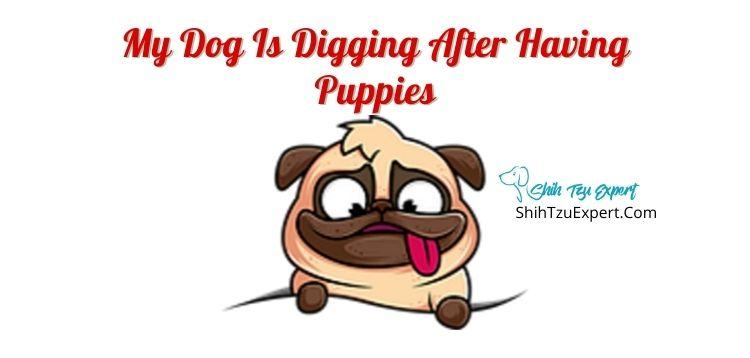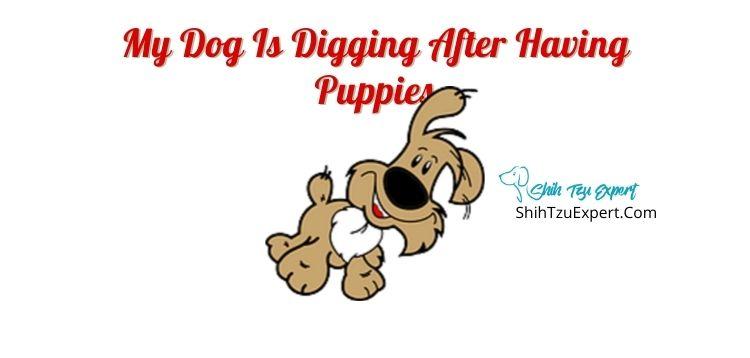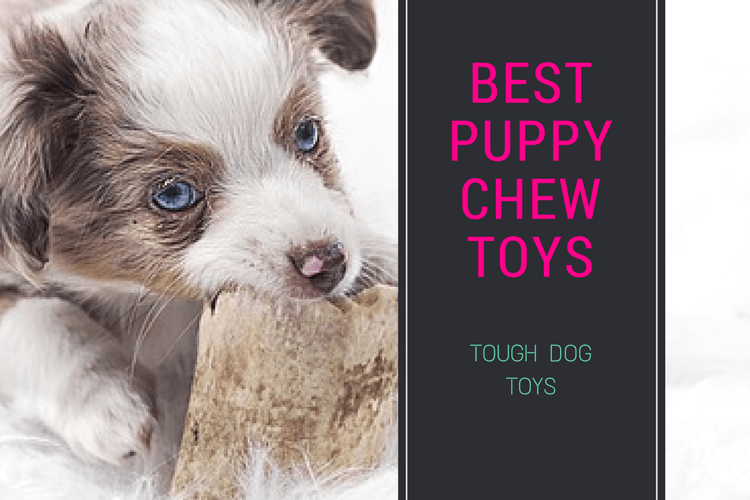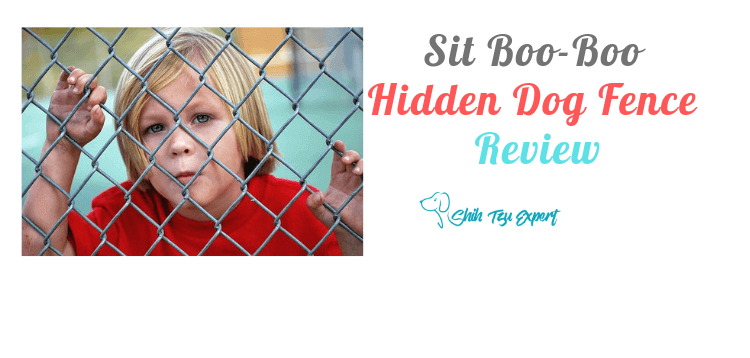There can be a number of reasons why your dog is digging after giving birth. This is mostly either due to wanting to make their den comfortable or needing to find somewhere more secure. Or, it could be due to a more cynical reason, such as trying to bury them.

Do All Dogs Dig After Giving Birth?
Digging is not necessarily a behaviour all dogs will exhibit after they have given birth, however, a lot of dogs will start digging inside the den they have created for themselves and their puppies to make it a lot more comfier for them.
Is This Normal Behaviour?
Whether or not this is normal behaviour completely depends on the type of digging behaviour your dog is exhibiting.
If your dog is digging inside their den, this is completely normal. This is because they are wanting to make their den area more comfortable for themselves and their puppies.
However, it’s if your dog is digging outside of their den that may be a cause for concern. If you have noticed your dog has anxiety after giving birth, digging outside of their den could be one of the other signs of this. It’s likely because they want their puppies in a more secure place.
If you want to avoid this from happening in the first place, you can make sure her whelping box is in a more secure place that isn’t somewhere where a lot of people are likely to walk past and that is in a corner or one of their preferred places so they feel a bit more secure.
Do I Need To Take Her To The Vet?

This depends on the seriousness of the digging. For example, if your dog is digging and panting after giving birth, this can be a sign that your dog has low calcium levels from having eclampsia. This can also cause restlessnes, pacing, crying, and increased thirst and urination.
However, there are more serious side effects to this that will definitely involve a trip to the vets. This includes gait problems, tremors, muscle spasms, and even seizures. If you notice any of these signs, get your dog to the vets immediately.
Is Digging Dangerous To The New Born Puppies?
Digging shouldn’t be dangerous to newborn puppies because the mother dog is only trying to make the den is comfortable as possible for her and her puppies. It should only be viewed as serious if the mother dog appears to be trying to bury her puppies.
If this happens it’s because for some reason the mother has rejected her puppies. In this case, leaving the puppies with the mother is likely to kill them. This rejection will likely happen if they puppy is having a medical issue, so getting this addressed may mean the mother accepts them.
Why Do Dogs Dig After Having Puppies?
If your dog is digging after having puppies, the likely reason behind this is that they are trying to make their den more comfy for them and their puppies.
On the other side of that, they could also be digging because they don’t feel safe where their whelping box is and are looking for a safer place to nurse their puppies. In this case, it might be a good idea to give your dog somewhere quieter and more secluded so they don’t feel the need to do this.
Why Is My Nursing Dog Digging?
Your nursing dog digging could be due to a number of different reasons. It could be because they are wanting to make the den comfier for her and her puppies. Or, it could be because she doesn’t feel safe in her whelping box and is looking for somewhere more secure.
Dog Nesting After Having Puppies & What Is Nesting?
Nesting is where a pregnant dog prepares somewhere for her to give birth to and look after her puppies once they’re born. This may also be why they start digging as they’ll either be trying to make it comfy or find somewhere else to nest.
Does A Dog’s Behavior Change After Having Puppies?
Yes, your dog is likely to change in behaviour after they’ve had their puppies. Even though this behaviour will likely go back to normal a few weeks after your dog has given birth and her puppies are more self-reliant, you still need to be aware of some possible behaviour changes.
One of these behaviour changes is aggression. This is more due to her instinct to protect her puppies than anything else. The levels of aggression will vary in each dog, with some only growling a little and showing teeth, to others lunging and trying to bite you.
Your dog should calm down over time. Things you can do to avoid this aggression is to not let any other household pets or people near her or the puppies, enter the room where her whelping box is in a calm manner, and only handle the puppies when you absolutely have to.
However, there is a small chance that this aggressive behaviour won’t disappear in a few weeks like it’s supposed to. In cases like this, contact your vet and see if there is anything they can do, such as putting your dog on medication, to help get rid of this aggression.
Another behaviour change you might notice in your dog after they have given birth is anxiety. This is most likely to occur if this is their first litter, however, this should only last the first couple of days after they have given birth.
Signs of anxiety in your dog once they have given birth may look like her whining and trembling, particularly if someone goes near her puppies, becoming over clingy with you, and licking the puppies too much, which can leave them feeling a little wet and cold.
If you are wanting to reduce anxiety in your dog, you can do so by talking to them in a calm voice, keep the room calm where they’re based in, give her some high quality canned dog food, and give her plenty of praise when she’s looking after her puppies so she knows she’s doing it right.
Despite this anxiety likely only going to show for the first couple of days, if it lasts for longer or seems a lot more heightened than you would expect, it might be best for you to contact your vet. However, if your dog is restless and trembles, this could be a sign of eclampsia, which requires immediate attention.
You might also notice that your dog has become lethargic after giving birth. In this case, she will be acting sluggish and may possibly be also neglecting her puppies. This could be due to an infection and you will need to take your dog and her puppies to the vets immediately.
Accidents are also likely to occur once your dog has given birth. This is often due to your dog not realising it’s safe for her to leave her puppies alone for a few moments while she goes to the toilet. This should stop a few days after delivery, so just be patient with her.
However, whilst she is having toilet issues, there are things you can do to help her. You can put newspapers or training pads down in the whelping box so she can go to the toilet whilst still keeping an eye on her puppies.
Other things you can do to help is by offering her treats to try and get her out of the whelping box to outside to go to the toilet. If she’s having more accidents a few days after giving birth, then you should take her to the vets as there may be a medical issue behind this.
In very extreme and rare cases, your dog will attempt to and possibly actually eat her puppies. This is likely to happen if the mother believes her puppies are making too much noise and thinks this noise might attract predators, even though they are unlikely to encounter any predators within your home.
In the rare case that this does happen, you should immediately remove any of the surviving puppies away from her. They should only be allowed near her again for short and supervised periods of time so they can be fed. You should also clean them yourself with a warm and wet cloth.
This behaviour is only likely to occur a few hours to a couple of days after your dog has given birth. The vet should be called immediately after your dog has tried to or actually eaten her puppies and breeding should not occur again as the behaviour will only be repeated.
Dogs Dig Outside Of The Whelping Box
If your dog is digging outside of the whelping box, this is a sign that they do not like the whelping box they are currently in and are wanting to move elsewhere. This may be because the box is in a busy area or for whatever reason they don’t feel so safe where the box is.
The easiest solution to this is to have thought before your dog gave birth about where the best place to put her whelping box is. Perhaps figure out where her favourite place is to go for a bit of quiet time and put it there, especially if that spot isn’t where a lot of people tend to walk through.
However, if you hadn’t thought of this and your dog is digging outside of the whelping box after giving birth, what they are likely to then do is search for another spot that’s more secluded and once she has found this spot, she will then start transferring her puppies to this place.
Is The Mother Trying To Bury The New Born Pups? Even If They Are Still Alive?
There is a chance that when the mother dog is digging, she’s actually trying to bury her puppies. This will likely happen if the mother dog has rejected one or all of the puppies for some reason, which will involve some intervention from you so the puppy(ies) don’t die.
Should You Stop A Dog From Digging After Having Puppies?
Regardless of whether your dog is digging inside or outside of their whelping box, you shouldn’t try and stop them. If they are digging inside the box, this is a completely natural thing for them to do as they want to make the box comfier for them and their puppies, so they shouldn’t be disturbed.
Whenever they’re digging outside the box, even though this isn’t necessarily an ideal situation, they also shouldn’t be stopped from doing this. They are only doing so because they want to find a better place to nurse their puppies, so shouldn’t be stopped or prevented from doing so.
How To Stop A Dog From Digging After Having Puppies?
Instead of stopping your dog from digging, you should enable the behaviour to happen because as soon as they feel happy and secure with the place they are nursing their puppies, the sooner this behaviour will stop. Instead, you should find ways to manage this behaviour.
One of the ways you can manage this digging behaviour is by letting your dog have as much alone time with their puppies as possible. Don’t let anyone else, regardless of whether they live in your house, are a guest in your home, or are another pet, have any access to them.
The second thing you should try and do is to try and take your dog outside for some fresh air. This will also give your dog time to relieve themself and may possibly help her to settle back in better when she goes back inside to be with her puppies.
If she still feels the need to try and relocate her puppies after you have tried these tips, you should just leave her to it. Once she has relocated her and all of her puppies to a place where she feels more secure and content, the digging should stop.
References
https://www.interviewarea.com/frequently-asked-questions/why-is-my-dog-digging-after-having-puppies
https://wagwalking.com/behavior/why-do-dogs-try-to-bury-their-puppies

![Best Cheap Dog Foods - our Top 10 Picks of High Quality Brands That Are Still Affordable [Under $1 per pound!] in 2023 Best Cheap Dog Foods - our Top 10 Picks of High Quality Brands That Are Still Affordable [Under $1 per pound!] in 2023](https://shihtzuexpert.com/wp-content/uploads/2018/01/Best-Cheap-Dog-Food-Featured-image.png)
![10 Best Dog Crates for Separation Anxiety [High anxiety dog crates 2019 Reviews] 10 Best Dog Crates for Separation Anxiety [High anxiety dog crates 2019 Reviews]](https://shihtzuexpert.com/wp-content/uploads/2019/05/5-3.jpg)

